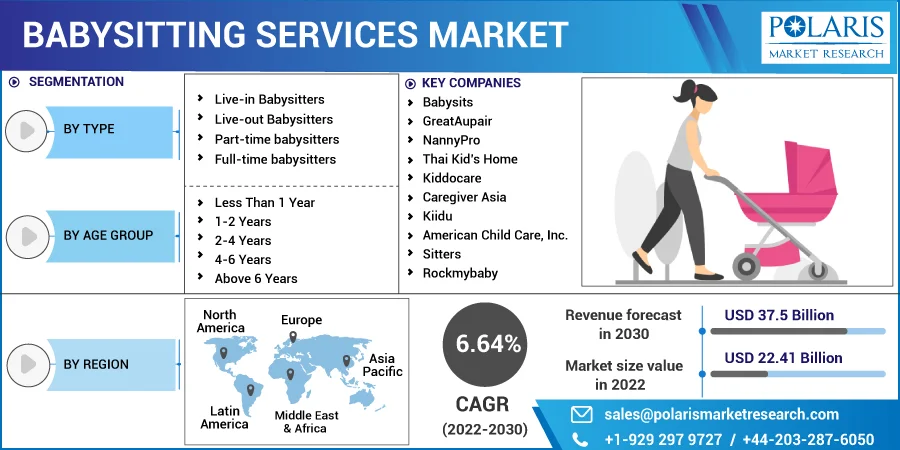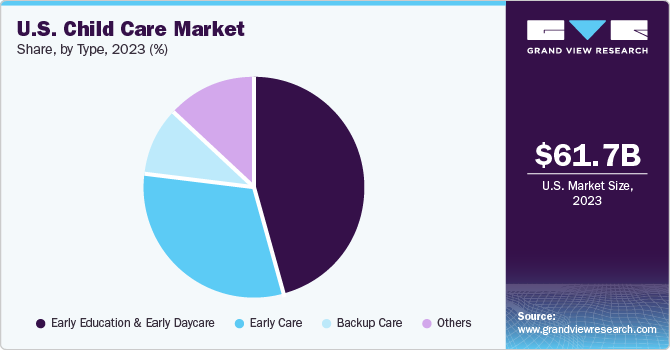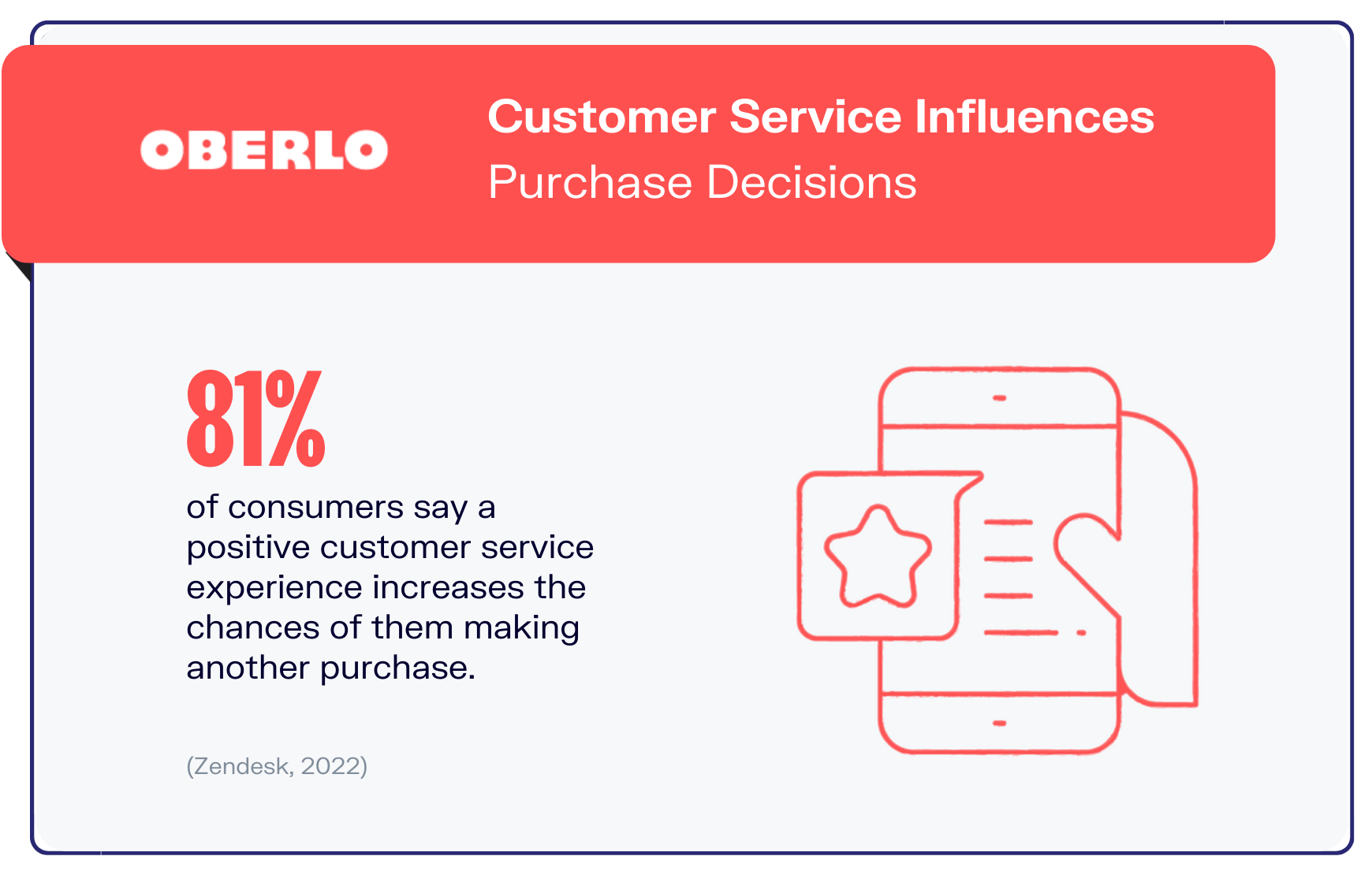The nanny industry has experienced steady growth over the past decade. The global nanny services industry reached an evaluation of $22.41 billion in 2022 and is expected to reach $37.5 billion by 2030. This upward trend is expected to continue as more dual-income families and single parents seek reliable childcare solutions.

When starting a nanny agency, you have the opportunity to tap into this demand by connecting families with qualified, thoroughly vetted nannies. The ideal agency operator has a passion for helping households run more smoothly as well as expertise in recruitment, screening, training, and ongoing career support for nannies.
This guide will walk you through how to start a nanny agency. Topics include market research, competitive analysis, registering an EIN, obtaining appropriate business insurance, forming a legal business entity, and more.
1. Conduct Nanny Agency Market Research
Market research is integral to starting a successful nanny referral agency. It offers insight into your target market, trends among live-out and live-in nanny services, market saturation, and more.

Some details you’ll learn through nanny business market research include:
- The industry is highly fragmented indicating ample opportunities for new players to establish themselves.
- Agencies catering to families seeking bilingual nannies or caregivers trained in early childhood development could corner the market in their region.
- While labor costs account for over 60% of revenue in a typical nanny agency, technology also represents a significant expense.
- Companies that implement online platforms and apps for scheduling, timesheets, and communication can improve convenience for clients while optimizing behind-the-scenes workflow.
- Mobile optimization also allows families and nannies to access agency services on the go.
- Participation in the workforce among mothers of young children continues to increase.
- While the target client base may evolve over the next decade, the underlying demand for caregiver services remains strong.
- Based on high fragmentation among current providers and ongoing market growth, the outlook remains optimistic for this industry.
The nanny placement sector provides a scalable business model, fulfilling the real needs of dual-income, single-parent, and other households requiring childcare assistance. By combining genuine customer service with an efficient behind-the-scenes operation, savvy entrepreneurs can claim their share of this multibillion-dollar market.
2. Analyze the Competition
Understanding the competitive landscape is crucial for any new business, including nanny agencies. Whether launching online only or opening a physical office, monitoring rivals helps identify your differentiators and opportunities.

Research brick-and-mortar competitors in your geographic area first. Note services offered, clientele demographics, staff qualifications, and any niche specialties. Drive by locations to observe visibility, signage, office layout, and client traffic levels.
Evaluating online competitors allows insight even if not located near you physically. Search for agencies servicing your target region; identify their website traffic levels from tools like Alexa and SEMrush.
Analyze sites for user experience, mobile optimization, and client portal features. Review their job postings to gauge compensation packages and nanny prerequisites. Also, browse review platforms to see feedback from past clients and candidates.
Monitoring competitors online and offline over time is advised even after launching. Regular competitive analysis exposes new rivals, opportunities to improve services, upcoming events for consumer outreach, and potential partnerships like referral agreements.
Ongoing competitor monitoring provides actionable data to refine service offerings, marketing messages, or internal processes as the agency evolves. Given the localized nature of this industry, research should occur continually across both digital and brick-and-mortar channels.
3. Costs to Start a Nanny Agency Business
When starting a nanny agency, plan for both initial investments to establish operations as well as recurring monthly expenses. Upfront costs typically include legal registration fees, office preparations, hiring staff, developing digital platforms, and pre-launch marketing.
Some costs involved in running child care businesses include:
Start-up Costs
- Registration & Incorporation: Expect $500-1200 to formally register your nanny agency as an LLC or other business structure depending on the state.
- Many entrepreneurs retain a business lawyer ($1500-3000) to aid with licenses and ensure regulatory compliance.
- Office Setup & Supplies: For brick-and-mortar agencies, basic office furnishings like desks and supplies range from $1500-2500 initially.
- Consider showroom aesthetics since clients may visit the space. A basic company website can be developed for $2000-3500.
- Technology Platforms & Tools: Client/employee portals, apps, payroll systems, and other tech platforms involve larger upfront builds but deliver long-term efficiencies. Budget $5000-15,000 for specialized development.
- Staffing: Initially hiring 1-2 office admin staff will cost $2000-3000 for recruitment fees. Employ a commission-based Sales Agent to aid launch marketing; salaries range from $45,000-$60,000.
- Insurance Requirements: General liability coverage is strongly advised starting at $1200/year. Additional policies like professional liability or commercial auto may be necessary depending on services.
- Pre-Launch Marketing: Allocate several thousand for branding, web design, advertising, and PR to announce your agency’s opening. Consider promotions for early client registrations.
- Rent & Utilities: Typical office lease for small agency: $2000-$3500 monthly. Expect higher rents in major metro areas.
- Payroll Expenses: Base admin salaries around $35,000-$45,000 annually. Sales/account management wages range from $55,000-$90,000 including commissions.
Ongoing Costs
- Technology Subscriptions: From payroll systems to CRMs, monthly software subscriptions for running operations range from $100-$500 per platform.
- Advertising: Maintain monthly Google/Facebook ad budgets ($500-2000) plus seasonal promotions of $1000-3000 during peak demand periods to continually attract new registrations.
- Insurance Premiums: $1200-2500 annually for general liability and other coverage renewals.
- Ongoing Recruitment: Retaining qualified nannies is central to success, requiring consistent investment in competitive compensation packages. Expect 20-30% annual turnover.
By planning for both the initial start-up investments as well as ongoing monthly overheads, new agency owners can strategically launch and scale their operations over time through meticulous financial preparation and cash flow management.
4. Form a Legal Business Entity
When establishing a nanny agency, the legal structure you choose impacts taxes, personal liability, and business continuity if seeking outside investors. While sole proprietorships offer simplicity, incorporating early on provides more protection.
Sole Proprietorship
A sole proprietorship provides an easy setup with no formal registration needed initially beyond local business licenses. Owners report income and losses on their tax returns. However, the owner assumes full liability for debts and lawsuits against the agency. Any legal action can threaten personal assets. Sole proprietors also lack credibility with clients and have difficulty raising external capital.
Partnership
Forming a general partnership splits liability exposure among partners. However, each partner can still be held fully liable for activity they didn’t control. Partnerships also terminate if a partner dies or leaves the agency. Income passes through to partners proportionately for tax purposes. While simple to establish via partnership agreements, nanny agencies rarely sustain partnerships long term.
Limited Liability Company (LLC)
Converting to a limited liability company (LLC) contains liability within the business. Your finances are shielded from legal issues and debts claimed solely against the company itself. LLC ownership is also flexible; units can be divided to retain control or sell stakes to outside investors down the road.
Corporation
Finally, S-corporation or C-corporation structures apply to agencies seeking funding for rapid expansion. Corporations levy taxes first at the entity level; the remaining profit passes through to shareholders. While this double taxation hampers small businesses, corporations can raise larger equity financing for growth. Ownership also transfers through selling shares if desired.
5. Register Your Business For Taxes
Nanny agencies must obtain an Employer Identification Number (EIN) from the IRS to handle payroll and tax duties properly. Here’s what agency owners should know about applying for and using an EIN:
An EIN serves as a social security number for your business. It identifies your company uniquely on federal tax documents for reporting wages paid to employees. An EIN is mandatory if hiring W-2 workers like nannies or office staff.
The IRS EIN application only takes minutes online. Simply navigate to www.IRS.gov and select the option to “Apply Online Now”. Provide basic information about your company and ownership structure. You often receive the EIN immediately upon submitting. This identifier is permanent until your company closes.
With your EIN, you can properly file quarterly payroll returns, unemployment paperwork, and W-2s for employees annually. It also satisfies requirements agencies must meet for taking on household clients claiming nanny expenses via the child and dependent care tax credit.
Additionally, visit your state revenue office to understand sales tax obligations both as a service provider and any retailing activities. Some states require additional business tax licenses beyond just the EIN which involves nominal registration fees.
Applying early for both federal (EIN) and state identifiers ensures your agency meets all compliance duties as an employer. With these registrations in place, you mitigate legal risks while demonstrating legitimacy to client families.
6. Setup Your Accounting
Running payroll, tracking caregiver hours, and managing household billing make financial tracking vital for nanny agencies. Using accounting tools lends helpful organization while enlisting a professional guide to optimizing finances for growth and compliance.
Accounting Software
Investing in small business accounting software like QuickBooks brings automation to tasks like invoicing and reporting. Integrations with bank/credit card accounts sync transactions, allowing you to categorize incomes and expenses within the platform. This preserves business records digitally in ready-to-use formats.
Hire an Accountant
Working with an accountant takes optimization further through specialized guidance. A bookkeeping professional can handle payroll returns, quarterly taxes, and reconciling statements monthly for around $300-500. Come tax season, your accountant can compile documentation for IRS reporting while discovering additional deductions and tax credits.
Open a Business Bank Account and Credit Card
Keeping business finances separate from personal avoids muddying the financial picture and reductions during an audit. Open dedicated checking/savings accounts and apply for a business credit card only used for company expenses. Manage this card responsibly to build your agency’s credit.
7. Obtain Licenses and Permits
When starting a nanny agency, a business license establishes legitimacy and operational compliance before officially opening for business. Find federal license information through the U.S. Small Business Administration. The SBA also offers a local search tool for state and city requirements.
Agencies employing admin staff, recruiters, etc require state unemployment insurance and may mandate temporary disability filings even for small teams. These programs often levy percentage-based taxes on gross payroll.
Along with a referral agency license, anyone working with children will require county criminal searches. A profitable business will have all these things in place before offering a local nanny service in their area.
Importantly, many states regulate businesses offering caregiver referrals or placements through nanny agencies. For example, Texas requires a Special Services license issued by the Health and Human Services Commission for all agencies matching families with childcare services.
These examples underscore the priority of researching your obligations around licensures, insurance requirements, allowable placement fees, and more based on state and federal regulations. Compliance provides families with the assurance of professional standards while reducing legal risks.
8. Get Business Insurance
Operating a nanny agency carries risks—both legal and financial. Obtaining proper business insurance coverage shields your company in the case of unforeseen incidents. It demonstrates credibility to client families while protecting the agency from scenarios that could otherwise incur significant liabilities exceeding most owners’ assets.
For example, a nanny could face accusations of child endangerment while on assignment. Without insurance, legal costs and potential settlements could shut down operations permanently. Confidential candidate data like background checks or medical histories could be breached digitally without cyber liability coverage in place.
The good news is that insurance for risks tied to childcare services is very attainable. Specialized policies like Professional Liability (PL) and General Liability (GL) address legal and accident-related exposures starting under $50 monthly. Having at least $1 million minimums per incident is recommended given the sensitive family environments agencies oversee.
Work with a commercial insurance broker to review protections relevant to your regional risks and specific operations. Expect to budget roughly $1500 or more annually for robust nanny agency coverage.
The process begins by detailing your services, number of contractors, household engagement terms, and other operational data so underwriters can quote appropriate plans. Be thorough—disclosing any potential risk scenario.
Expect the full application process to take 4-6 weeks before coverage takes effect. Maintain open communication with your broker for governance advice or adjusting policies as the agency evolves.
9. Create an Office Space
An office space lends critical credibility and convenience when meeting with nanny candidates and client families. While a home office suffices initially, consider these options as your agency grows:
Coworking Office
Seeking a dedicated workspace helps project success as you expand your roster. Coworking spaces like WeWork provide turnkey offices with mail handling, printing, conference rooms, and front desk staff for increased legitimacy. Memberships average $300-800 monthly depending on market and space amenities. Use coworking lounges to meet candidates if sensitive information will be discussed.
Retail Office
For childcare centers that also offer nanny services, on-site office space allows private meeting areas, and keeping an eye on staff. Expect monthly rents of $1000-$4000 for 1-3 offices including utility costs and lease terms often span 3-5 years. These spaces best suit established brands seeing multiple clients and candidates simultaneously each week, justifying the longer commitment.
10. Source Your Equipment
Launching a nanny agency does not require extensive upfront investments in specialized equipment. Focus initial material purchases on essential office furnishings and technology to conduct recruitment and screening processes. Consider the following sources:
Buy New
New office essentials like desks, chairs, and supplies run $1500-2000 from big box retailers if opting for an equipped home office instead of leased space. Purchase new computers ($700-1200) allowing video calls for remote interviews. Mobile devices should enable easy communication/coordination with clients and candidates.
Buy Used
Browse used office liquidators to save on furnishing a space affordably while maintaining professionalism. Sites like Craigslist and Facebook Marketplace list local desks, file cabinets, etc around 25-50% below retail. Refurbished PCs and laptops cost under $500 via top-rated eBay vendors.
Go Virtual
For technology, utilize free cloud-based platforms as much as possible early on instead of purchasing software licenses. For example, Google’s Workspace or Office 365 offers low-cost monthly access to shared drives, video chat, email, documents, and more. Invest in customer relationship management (CRM) systems and other workflow tools slowly as client pipelines grow.
11. Establish Your Brand Assets
Establishing a professional brand presence is crucial for nanny agencies to inspire trust and credibility with local families. From logo development to crafting a website, these foundational elements convey professionalism across every client touchpoint.
Get a Business Phone Number
Securing a dedicated business phone line via providers like RingCentral allows listing a static agency number online and on all materials instead of personal cell phones. Expect to budget $30+ monthly for a local or toll-free number with call routing features.
Design a Logo
Creating a logo and visual brand identity aids recognition as families encounter your services across platforms. Consider an icon representing childcare paired with a refined color scheme that feels trustworthy yet warm. Logo makers like Looka offer affordable DIY tools and designer-crafted options to match any vision and budget.
Print Business Cards
Business cards make introductions effortless when meeting prospective clients, partners, and candidates away from the office. They enable quick follow-up and referral sharing after in-person meetings as well. Have these essentials printed via Vistaprint to harness discounts on materials like letterhead, postcards, and brochures allowing you to always represent the brand professionally.
Get a Domain Name
Take your nanny business online. A customized domain name conveys expertise and builds credibility through a consistent online presence. Options like NameCheap make registering and hosting intuitive and affordable from $15-50 annually.
Design a Website
An information-rich website serves as your always-open virtual reception area for families to learn about services, read staff bios, and contact your team. User-friendly site builders like Wix offer pre-made templates for custom-populating pages with the agency’s unique content. Freelancers from Fiverr can construct custom platforms aligned to a detailed brand style guide.
12. Join Associations and Groups
While launching a nanny agency involves independent effort, connecting with industry peers lends helpful perspective and partnerships along the journey. Local associations, meetups, and online groups provide the community.
Local Associations
Joining relevant trade associations helps you stay atop regulations, trends, and opportunities through regular gatherings and communications. For example, the National Childcare Association unites agencies for annual conferences and salary surveys.
Local Meetups
Attending community meetups facilitates networking with fellow business owners plus related providers like pediatrics clinics or home/family therapists who could refer clients to your services. Sites like Meetup help locate events for entrepreneurs, moms groups, and working parents relevant to meet potential referral partners.
Facebook Groups
Participating in Facebook Groups around topics like “Nannies” or “New Moms Essentials” containing thousands of engaged members nationally enables community building through sharing your expertise via posts or comments. Groups like Nanny Careers USA and Live-In & Out Nanny Connection: For Families, Housekeepers & Nannies in the USA connect you to like-minded individuals and businesses.
13. How to Market a Nanny Agency Business
Marketing is oxygen for nanny agencies needing continual family leads and candidate sourcing to thrive. While word-of-mouth referrals from delighted clients provide the best exposure, agencies must also broadcast their services across digital and traditional channels welcoming new relationships.
Referral Marketing
Satisfied parents serve as brand ambassadors sharing experiences within neighborhood groups and social circles. Consider incentivizing referrals through discounts or awards to catalyze growth through trustworthy peer sharing.
Digital Marketing
A balanced digital strategy raises awareness while conveying expertise to site visitors that convert into registrations. Useful approaches include:
- Google Ads targeting localized keywords like “nanny agency near me” and relevant long-tail phrases with location modifiers
- Facebook and Instagram ads focused on working parent demographics within your service area
- Producing a YouTube channel or podcast covering child development best practices
- Authoring blogs and newsletters full of parenting tips, kid-friendly recipes, and childcare advice
- Pursuing earned media through press releases and contributor pitches to parenting-focused publications
Traditional Marketing
While digital engagement should lead strategy, selecting traditional tactics can assist conversions for the right niche. Examples to test on a small scale include:
- Piggybacking on existing family-oriented events by sponsoring or distributing flyers
- Using direct mail to share registration promotions with households likely needing childcare assistance
- Providing free classes for families at libraries, recreation centers, clinics, etc. addressing caregiver selection
- Hosting booths with giveaways at large conventions, job fairs, or cultural festivals
- Advertising with specialty publications, websites, and radio stations popular among target demographics
The most effective mix includes digital discovery and consideration funnels while leveraging traditional venues to motivate registrations or appointments with the agency’s specialists.
14. Focus on the Customer
Delivering exceptional service is the lifeblood of referral-driven businesses like nanny agencies. How you make clients and candidates feel during a tumultuous time like sourcing childcare sets the tone for your brand affinity long-term.

Consider the first months with a new nanny as an emotional rollercoaster for parents. Fears around trust and children’s safety never fully subside. Check in often for reassurance while handling any conflicts with care should miscommunications arise. Exceeding expectations around screening and matching will delight families.
For candidates, the interview and onboarding process into a new home is equally stressful. Provide extensive coaching to set appropriate boundaries while encouraging open dialogue around preferences so perfect placements occur.
Opening a nanny referral agency means working closely within a family setting. When households feel genuinely supported through major childcare transitions, gratitude and loyalty follow. The payoff? Rave reviews shared across community networks, five-star online ratings, and excited referrals to friends facing similar challenges.
